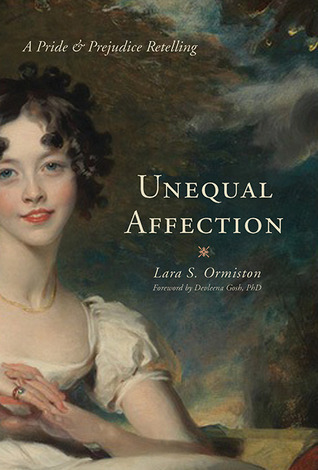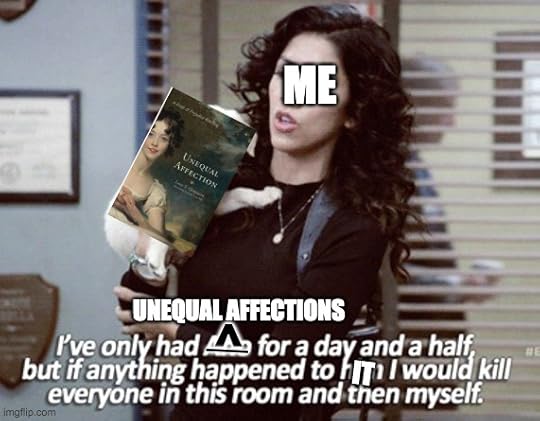What do you think?
Rate this book


352 pages, Hardcover
First published October 1, 2013
Even more dismally she recalled the vehemence with which she had criticized and laughed at Mr. Darcy the previous autumn. How much she wished she had been more moderate in her expressions, more discreet in her opinions! Would there be a person among them who would doubt that she accepted him only for his wealth? In her mind’s eye she could see her neighbors’ knowing looks and half-hidden smirks. No one would blame her, of course. They would think her uncommonly clever to have made such a match, even while they pitied her for her proud and unpleasant husband.It offers an alternate view of Mr. Bennet that may seem controversial, but I found believable.
"[The younger Bennet sisters] are spoiled, vain, and silly, with no sense of propriety and hardly even of common decency. Their mother positively encourages them, while their father has the sense to know better, yet chooses to mock them rather than make any attempt to restrain them.”I have to admit that is sadly true, Mr. Bennet obviously adores Lizzy and Jane, but he is sadly neglectful of his younger daughters, choosing to ignore them instead of disciplining them. Undoubtedly, he plays favorites, and this book points this fact out quite well in a way that I found to be quite reasonable.
She sighed, sitting down on a fallen log. “It’s not just Sir William, you know. Mrs. Long, the lady you once sat next to for half an hour without speaking? She can seem like a foolish old woman when you first meet her, but she has a very tender heart. Nearly all of her free time she spends making clothes for local children."Darcy and Elizabeth's courtship---naturally, does not end with the acceptance of the engagement. She has to struggle with her own emotions and guilt in entering a marriage she admits, with somewhat mercenary attitudes at first. He has to struggle with the fact that he may be forcing a woman he loves and respects into a trap, rather than a marriage. Darcy has to come to terms with the fact that he doesn't have the solution when it comes to Elizabeth.
“Even my mother has her moments,” she continued, a reminiscent tone taking over her voice. “One year we got news that one of our tenants had an infant son who was sick and going to die. Perhaps because it was a boy, and she had never been able to have one herself, but there was a look on her countenance I never saw before—or since—and before I knew it, she was out the door with Hill and blankets and hot soup and a bottle of Hill’s all-purpose remedy that she used to dose us all with regularly as children, and we did not see anything more of either of them for the rest of that day or the night. When morning came she returned, looking tired, and went straight to her room. She never talked of it—I think she thought a woman of her station should not be nursing the tenants’ children—and out of respect for her neither did Hill, but we heard afterwards that the little boy recovered, and his mother swore that my mother saved his life.”
“I was selfish!—because I thought only of how much I wanted her; I was arrogant because I was so certain that marriage to me would be an unalloyed good for her. She was poor; I would make her rich. She was unmarried; I would make her a wife. She was unappreciated and unequalled in her current company; I would take her and place her among society worthy of her. I would give all and be all, and never did I consider how little she truly desired anything I had to offer.”Lest you think the whole book is based on histrionics and bold declarations of love---it's not. It is sweet, the relationship and love and misunderstandings between Elizabeth and Darcy and her family are well built and believable. This book presents dimensions within the original that I never expected. I loved it.
“‘My only regret is that I did not love her more. If I had loved her more—if I had thought more of her feelings and less of my own—then I would have courted her properly… I was selfish!—because I thought only of how much I wanted her; I was arrogant because I was so certain that marriage to me would be an unalloyed good for her. She was poor; I would make her rich. She was unmarried; I would make her a wife. She was unappreciated and unequalled in her current company; I would take her and place her among society worthy of her. I would give all and be all, and never did I consider how little she truly desired anything I had to offer.’”
“In vain have I struggled. It will not do. My feelings will not be repressed. You must allow me to tell you how ardently I admire and love you. He then proceeds to explain how he loves her against his will, against his reason, and even against his character. Insulted by his prejudice against her family, appalled by his injustice towards Mr. Wickham and angered by his part in separating her sister Jane from Mr. Bingley, she finalizes her refusal by proclaiming that he was “the last man in the world whom [she] could ever be prevailed on to marry.”
(I still prefer Colin Firth as Mr. Darcy but this is the gif I could find on short notice meeting my criteria.)


Darcy: "Besides, Elizabeth’s company calmed him. He could forget anything in the presence of her eyes and smiles. If he left her he would do nothing but brood—about his family, about her family, and most of all about her and her heart—that most desirable, most mysterious, most elusive of organs."
“If a book is well written, I always find it too short.”


Why did he have to be so charming in some ways and so insufferable in others? She was sure she had hurt far more than just his pride. Would it always be so hard?
She had been proposed to by a stranger. A very rich, very handsome stranger who was very much in love with her. She could not possibly accept him—but, suddenly, she could not possibly refuse him either, not now. This was, she knew clearly, a chance unlike any other she would ever receive. She could not turn him down for the satisfaction of it. She had to think.
You will need fear nothing as my wife, neither poverty nor loneliness, dishonor, or disloyalty, unkindness, neglect . . . you will be the most cherished wife in all of England.”
As for Darcy, he had been completely unable to speak. Elizabeth’s words had cut through him like knives, shaming him deeply, and shame was not an emotion he was accustomed to experiencing…Was it possible that he, who had studied throughout his life to improve his mind and character, had overlooked such an essential flaw?…He had not understood her then, but he did now. His refusal to talk was an active unkindness, a deliberate slight on the value of those he had thought beneath him. He had not thought their feelings even worth the effort of a few polite remarks and a smile or two. He certainly had not been willing to consider lowering his own dignity to promote theirs. Nor . . . his brows furrowed deeply in pain . . . nor to promote Elizabeth’s happiness either.